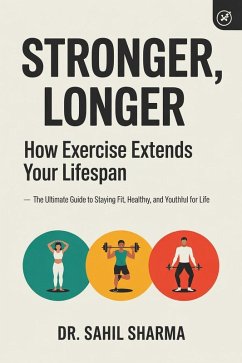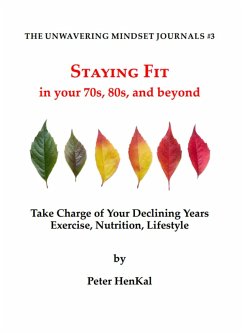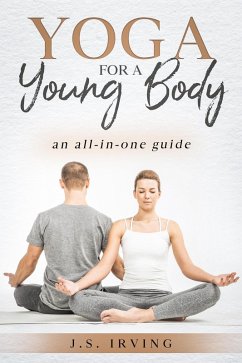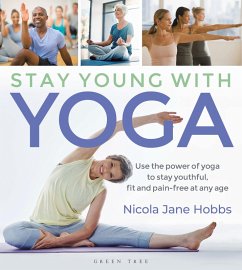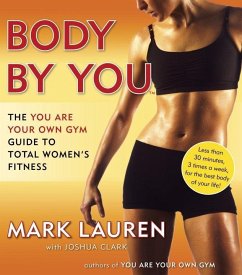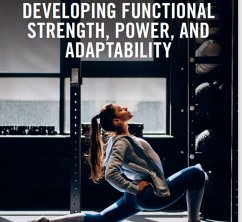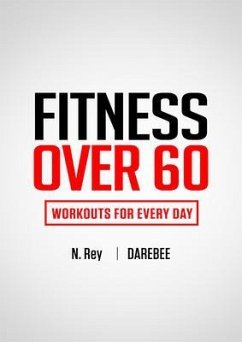
Staying Young (eBook, ePUB)

PAYBACK Punkte
0 °P sammeln!
As we age, maintaining health and vitality becomes increasingly important. For seniors, staying young and fit through exercise and proper nutrition is not only about adding years to life but also about adding life to years. A balanced approach to physical activity and diet can significantly enhance the quality of life, promote independence, and prevent many age-related conditions.Exercise for Seniors: The Fountain of YouthRegular physical activity is crucial for seniors, offering benefits beyond physical health. Engaging in exercise helps to maintain muscle mass, improve balance and coordinati...
As we age, maintaining health and vitality becomes increasingly important. For seniors, staying young and fit through exercise and proper nutrition is not only about adding years to life but also about adding life to years. A balanced approach to physical activity and diet can significantly enhance the quality of life, promote independence, and prevent many age-related conditions.
Exercise for Seniors: The Fountain of Youth
Regular physical activity is crucial for seniors, offering benefits beyond physical health. Engaging in exercise helps to maintain muscle mass, improve balance and coordination, and enhance cardiovascular health. These improvements reduce the risk of falls and related injuries, common concerns among older adults. Additionally, exercise has been shown to boost mood, reduce symptoms of depression and anxiety, and improve cognitive function, which is vital for mental sharpness and emotional well-being.
A well-rounded exercise routine for seniors should include four key components:
Aerobic Exercise: Activities such as walking, swimming, and cycling improve heart and lung health. Aim for at least 150 minutes of moderate-intensity aerobic exercise per week.
Strength Training: Using resistance bands, weights, or body-weight exercises like squats and push-ups helps maintain and build muscle mass, essential for daily activities.
Flexibility Exercises: Stretching and activities like yoga enhance flexibility, making it easier to perform everyday tasks and reduce the risk of injury.
Balance Training: Exercises such as tai chi and balance drills improve stability, helping to prevent falls.
Nutrition: The Building Blocks of Health
A nutritious diet plays a pivotal role in supporting the health and fitness of seniors. Proper nutrition helps maintain energy levels, supports the immune system, and prevents chronic diseases such as diabetes, heart disease, and osteoporosis. Key nutritional considerations for seniors include:
Adequate Protein Intake: To counteract muscle loss (sarcopenia) that comes with aging, seniors should include protein-rich foods such as lean meats, beans, eggs, and dairy in their diet.
Vitamins and Minerals: Essential nutrients like calcium and vitamin D are critical for bone health, while vitamin B12 supports nerve function and red blood cell production. Seniors may need to consider supplements if these nutrients are not adequately obtained through diet.
Fiber: High-fiber foods such as fruits, vegetables, and whole grains aid in digestion and prevent constipation.
Hydration: Seniors are at higher risk of dehydration, so drinking plenty of water throughout the day is important.
Creating a Sustainable Lifestyle
For seniors, adopting a lifestyle incorporating regular physical activity and balanced nutrition requires motivation and practical strategies. Setting realistic goals, seeking social support, and finding enjoyable activities can make these healthy habits sustainable. Programs specifically designed for older adults, such as senior fitness classes or community nutrition workshops, can provide structure and community engagement, making the journey towards staying young and fit both rewarding and fun.
In conclusion, by embracing regular exercise and mindful nutrition, seniors can significantly improve their health, maintain independence, and enjoy a vibrant, fulfilling life. It's never too late to start; even small changes can lead to significant benefits, proving that age is just a number when leading a healthy and active lifestyle.
Exercise for Seniors: The Fountain of Youth
Regular physical activity is crucial for seniors, offering benefits beyond physical health. Engaging in exercise helps to maintain muscle mass, improve balance and coordination, and enhance cardiovascular health. These improvements reduce the risk of falls and related injuries, common concerns among older adults. Additionally, exercise has been shown to boost mood, reduce symptoms of depression and anxiety, and improve cognitive function, which is vital for mental sharpness and emotional well-being.
A well-rounded exercise routine for seniors should include four key components:
Aerobic Exercise: Activities such as walking, swimming, and cycling improve heart and lung health. Aim for at least 150 minutes of moderate-intensity aerobic exercise per week.
Strength Training: Using resistance bands, weights, or body-weight exercises like squats and push-ups helps maintain and build muscle mass, essential for daily activities.
Flexibility Exercises: Stretching and activities like yoga enhance flexibility, making it easier to perform everyday tasks and reduce the risk of injury.
Balance Training: Exercises such as tai chi and balance drills improve stability, helping to prevent falls.
Nutrition: The Building Blocks of Health
A nutritious diet plays a pivotal role in supporting the health and fitness of seniors. Proper nutrition helps maintain energy levels, supports the immune system, and prevents chronic diseases such as diabetes, heart disease, and osteoporosis. Key nutritional considerations for seniors include:
Adequate Protein Intake: To counteract muscle loss (sarcopenia) that comes with aging, seniors should include protein-rich foods such as lean meats, beans, eggs, and dairy in their diet.
Vitamins and Minerals: Essential nutrients like calcium and vitamin D are critical for bone health, while vitamin B12 supports nerve function and red blood cell production. Seniors may need to consider supplements if these nutrients are not adequately obtained through diet.
Fiber: High-fiber foods such as fruits, vegetables, and whole grains aid in digestion and prevent constipation.
Hydration: Seniors are at higher risk of dehydration, so drinking plenty of water throughout the day is important.
Creating a Sustainable Lifestyle
For seniors, adopting a lifestyle incorporating regular physical activity and balanced nutrition requires motivation and practical strategies. Setting realistic goals, seeking social support, and finding enjoyable activities can make these healthy habits sustainable. Programs specifically designed for older adults, such as senior fitness classes or community nutrition workshops, can provide structure and community engagement, making the journey towards staying young and fit both rewarding and fun.
In conclusion, by embracing regular exercise and mindful nutrition, seniors can significantly improve their health, maintain independence, and enjoy a vibrant, fulfilling life. It's never too late to start; even small changes can lead to significant benefits, proving that age is just a number when leading a healthy and active lifestyle.
Dieser Download kann aus rechtlichen Gründen nur mit Rechnungsadresse in A, B, CY, CZ, D, DK, EW, E, FIN, F, GR, H, IRL, I, LT, L, LR, M, NL, PL, P, R, S, SLO, SK ausgeliefert werden.




